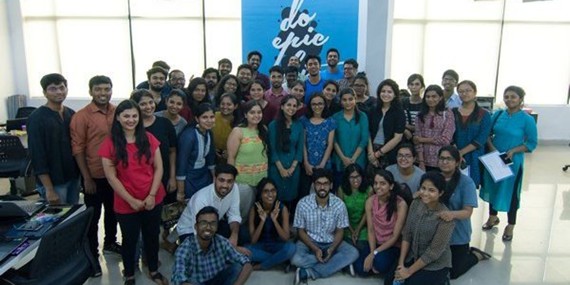Sarvesh Agrawal, CEO and founder of Internshala aligns himself with No Sir No Madam cause. Internshala is an online portal that enables students and interested individuals to find internship based on their liking.
Sarvesh has a degree in Bachelor of Technology from the renowned Indian Institute of Technology, Madras (IIM- M). He has accumulated experience of working both in India and abroad. Some of the major companies he has worked for are Capital One, Barclays Bank, and Aviva.
He has been a follower of No Sir No Madam doctrine ever since he came across it. After graduating, Sarvesh secured a job in Capital One, UK. During his initial days, he would address his colleagues and seniors with a salutation. However, once, a senior colleague notified him to communicate with everyone without pronouns.
This practice of communicating with each other on a first-name basis allows exchange and criticizing of ideas. More than praising the opinions, reprehending of views and suggestions is more important for the growth of the company. Hence he decided to implement the first-name custom in his organization as well.
Sarvesh opines “No salutation culture at the workplace allows you to build an idea-driven organization. Moreover, you realize the parity it purveys at the workplace. This, in turn, enables the junior to actively take part in company discussions and share their opinions. Sometimes, it has so happened that, a good idea came from the lowest ranked employee in the firm.
Additionally, it also certifies employees to criticize a bad idea. I have often seen in Indian companies that junior employees are afraid to be against an idea given by their senior managers.”
He narrates his experience while working for Capital One. Sarvesh voices — Several times, we used to engage in debates with the top-level executives without any fear. This was possible only because of No Sir No Madam tradition. Implementing the first-name habit at the workplace abolishes that symbol of hierarchy. Thus, enabling me to question my seniors without worrying about the impact it would have on my career.
Sarvesh ventures that ‘Sir/Madam’ convention is more prevalent in Indian government offices than any other organization. Due to his constant interactions with bureaucrats, he has learnt that officials are peculiar about salutation edict. As a result, he always ensures to address them as ‘Sir/Madam’ so that his business does not get affected.
Although, Sarvesh surmises, “A lot of youngsters have now joined the public sector. Subsequently, there has been a slow and positive change in public offices. One can only hope that with time and awareness, salutation dictum would be completely eradicated from the government sector.”
He shares his experience of one interaction, where he was helping his friend, who lives abroad. Sarvesh narrates — “My friend living in Spain needed help with some paperwork. As he could not be here, I visited the administrator’s office on my friend’s behalf. I was really amazed to see how fast my work got completed.
Usually, people loathe visiting government offices. In my case, however, the work got completed within a day, without any complications. I genuinely believe that the new generation is determined to help and solve issues. It is only the older generation that is adamant about being addressed with a salutation.”
Moreover, salutation order has created a huge gap between people from different backgrounds. The ones working as blue-collar workers have had to face the implications of ‘Sir/Madam’ tradition since ages. Sarvesh ventures that, they ought to be treated as equal. We need to liberate them from social taboos.
Ergo, they too should be made aware of No Sir No Madam custom. Additionally, corporations should work towards building an equal organization and solve the problem relating to the social disparity in our society.
Sarvesh winds up by quoting, “It is difficult to change how people treat others. However, you are completely in control of the way you interact with people around you. As we all know “charity begins at home,” we too, should individually spread awareness about No Sir No Madam by practicing it.







Add comment